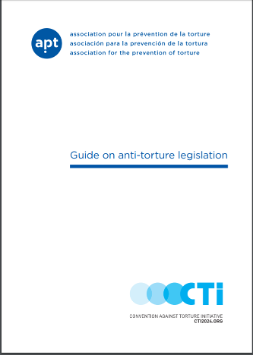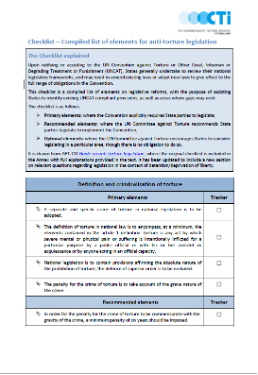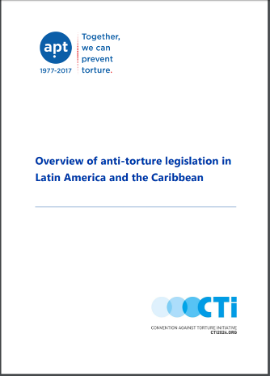
Anti-Torture Legislative Frameworks
A priority area for CTI is assisting States to draft and adopt legislation that prohibits, prevents and responds to incidents of torture or ill-treatment.
National anti-torture legislative frameworks: Basic elements
Preventing, prosecuting and eradicating torture and ill-treatment from all societies starts with a sound legal basis. The UN Convention against Torture highlights a number of specific areas where legislation is required, while the Committee against Torture has recommended or encouraged additional elements in respect of specific areas, some listed here:
- Crime of torture – providing a separate, specific offence of torture with appropriate penalties commensurate to the gravity of the crime is a necessary step to end impunity and to ensure that perpetrators are brought to justice.
- Complaints and investigations – providing in law a right to complain and procedures for investigations into allegations of torture are standard and positive practice. Read CTI’s Implementation Tool on complaints and investigations here.
- Non-admission of torture-induced evidence rule – national legislation is to provide for the exclusion of evidence obtained by torture or ill-treatment, which cannot be admitted and used in any proceedings.
- Read CTI’s Implementation Tool on non-admission of evidence obtained by torture and ill-treatment here.
- Non-refoulement –enshrining the prohibition against returning someone to where they are at risk of being subjected to torture or ill-treatment is a fundamental provision. Read CTI’s Implementation Tool on non-refoulement here.
- Remedies for victims – a right to redress for victims of torture and their families, including compensation and rehabilitation are to be included in legislation. For State practices and examples of legislative provisions providing for redress for victims of torture, read CTI’s Implementation tool here.
Legislating for safeguards: Arrest and detention
States have adopted a wide range of laws and regulations on safeguards to protect the rights of persons when they come in contact with law enforcement and other authorities. Such safeguards have the positive effect of streamlining processes and accountabilities, improving efficiencies, and supporting the overall administration of justice.
Read more in CTI’s UNCAT Implementation Tool on safeguards in the first hours of police detention.
Regulating the conduct of public officials
Clear regulations covering the standards of conduct for police and law enforcement, security services, prison services and other relevant bodies, coupled with training on those standards, are regularly adopted by States and form part of the overall framework to prevent excesses and abuses of authority. These often include regulating the use of force and firearms, or detailing the minimum material conditions of detention are in line with international standards.
CTI Guide and tools on anti-torture legislation
CTI has produced a guide and other documentation to assist States as they review their legislative provisions for compatibility with UNCAT, and take decisions on how they could be improved to prevent and respond to incidents of misconduct effectively and efficiently.

APT-CTI Guide on anti-torture legislation
CTI partnered with the Association for the Prevention of Torture (APT) to produce a Guide on anti-torture legislation, intended to assist lawmakers in drafting anti-torture legislation and in revising existing domestic laws. It is helpful also for other actors such as national human rights institutions, national preventive mechanisms, actors from civil society or international and regional organisations advocating for or supporting the adoption of an anti-torture legal framework at the national level.
The guide is structured to explain the primary (compulsory), recommended and optional elements requiring domestic legislation.
The guide is available in Arabic, English, French, Portuguese and Spanish.

Check-list – Compiled list of elements for anti-torture legislation
Complementing the APT-CTI Guide on anti-torture legislation, CTI developed a legal check-list to assist States in their efforts to review and amend national laws to be compliant with UNCAT, by identifying existing UNCAT-compliant provisions, as well as are areas where amendments might be needed.
The check-list is available in English here.

Overview of anti-torture legislation in Latin America and the Caribbean
This publication on legislative practices and trends in respect of anti-torture legal frameworks in Latin America and the Caribbean captures the experiences of both civil and common law systems and covers 17 Latin American and 14 Caribbean countries. It provides States in the region and beyond and other relevant stakeholders with valuable examples of anti-torture legislative and institutional frameworks in Latin America and the Caribbean, and further identifies gaps where further progress could be advanced.
The comparative overview is available in English and Spanish.
Legislative review processes
As States parties embark on the process of implementing the Convention, most start with assessing their existing laws and, where needed, domesticating basic provisions.
Drafting strategies
One of the frequently asked questions by legislative drafters, such as the Attorney General’s Office, national law commission, or other assigned bodies, as they embark on the process of reviewing the existing legislative framework, is whether it is more appropriate to:
- Draft specific stand-alone anti-torture legislation, with a view to implementing the Convention in full or partially;
- Amend existing legal provisions in various pieces of legislation, including the repeal of laws or provisions that are incompatible with the Convention; or
- A combination of the two
Early consultation with a wide range of stakeholders will help identify the best option in the relevant country’s context. There is no prescribed or preferred approach, as it largely depends on the country’s legal system and domestic context.
Those opting for a stand-alone anti-torture law tend to be countries that have a history of political torture or are emerging from situations of violent conflict or oppression, and seek to make a purposeful statement against torture. Other countries needing extensive amendments of different pieces of legislation have often found adopting a stand-alone anti-torture law as the most pragmatic approach. Many other States have opted to ensure legislative coherence and consistency, by “mainstreaming” torture prevention provisions within existing statutes.
CTI’s workshops on anti-torture laws
CTI has been supporting States in Africa, Asia, the Caribbean, Latin America, and the Pacific to strengthen their anti-torture legal frameworks through providing technical advice and capacity building support through regional seminars and anti-torture legislative drafting workshops.
Africa
In Africa, CTI convened a regional seminar on anti-torture laws for sub-Saharan African countries of civil and common law traditions, in Accra, Ghana, in April 2016. Participating States discussed good practices and challenges around domestic approaches taken to criminalise torture. In follow-up to that request, and in partnership with the African Commission on Human and Peoples’ Rights (ACHPR) and REDRESS, CTI convened two technical workshops on anti-torture legislative drafting in Africa:
- for English-speaking (common law) sub-Saharan African States, which took place in Entebbe, Uganda, in September 2017; and
- for Francophone African countries, which took place in Dakar, Senegal, in October 2018
Participants received collective as well as one-to-one technical advice from torture prevention experts and legislative drafters on ways to bring their anti-torture legal frameworks in line with UNCAT.
Asia
In Asia, CTI convened two regional seminars, both held in Bali, Indonesia, one addressed to ASEAN Member States, held in August 2015, and one for South East Asian and Pacific States, held in November 2019. Both seminars discussed domestic experiences in building and strengthening anti-torture legal frameworks, with particular emphasis on good practices and challenges in prohibiting and criminalising torture, implementing legal and procedural safeguards against torture and ill-treatment in police custody, and strengthening the effectiveness of policing and law enforcement agencies through training and capacity-building.
Latin America and the Caribbean
In the Pacific, CTI has convened two regional seminars to discuss benefits, challenges and opportunities related to UNCAT ratification and implementation, both held in Fiji, in October 2016 and February 2019. Discussions at the 2019 seminar specifically focused on law reform.
Compilation of Anti-Torture Laws and Amendments
Many States across regions have criminalised torture by adopting separate, stand-alone laws or introducing amendments into existing legislation. The examples provided in the table below are not exhaustive but rather, some positive illustrations of national examples from the different regions. Efforts were made to gather examples from countries in different regions, from different legal systems and traditions and from countries with different languages.
COMPILATION OF NATIONAL ANTI-TORTURE LAWS AND AMENDMENTS
| Stand-alone anti-torture legislation | Amendments/Other pieces of legislation | |
| Africa | – Democratic Republic of Congo – Kenya – Uganda – Madagascar – Mauritania – Equatorial Guinea | – Mali – Morocco – Senegal – Tunisia |
| Asia | – Philippines – Sri Lanka | – Cambodia – Viet Nam – Timor-Leste – Indonesia |
| Europe | – France – Italy – Spain – United Kingdom | |
| Americas and the Caribbean | – Antigua and Barbuda – Brazil – Mexico – Venezuela | – Argentina – Colombia – Chile – Canada – Panama – United States |
| Pacific | – New Zealand | – Australia – Nauru |

